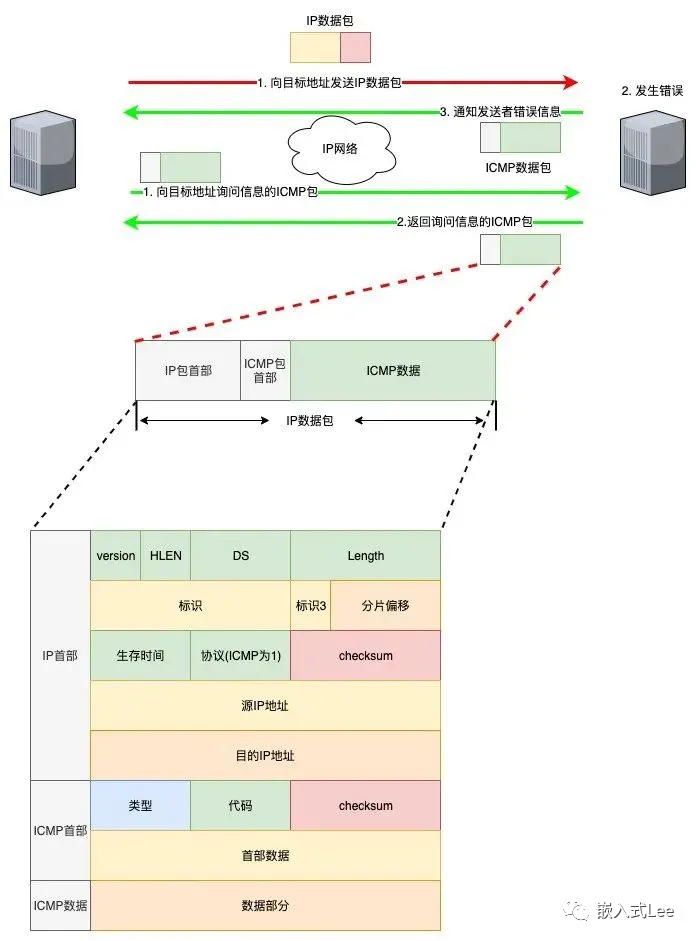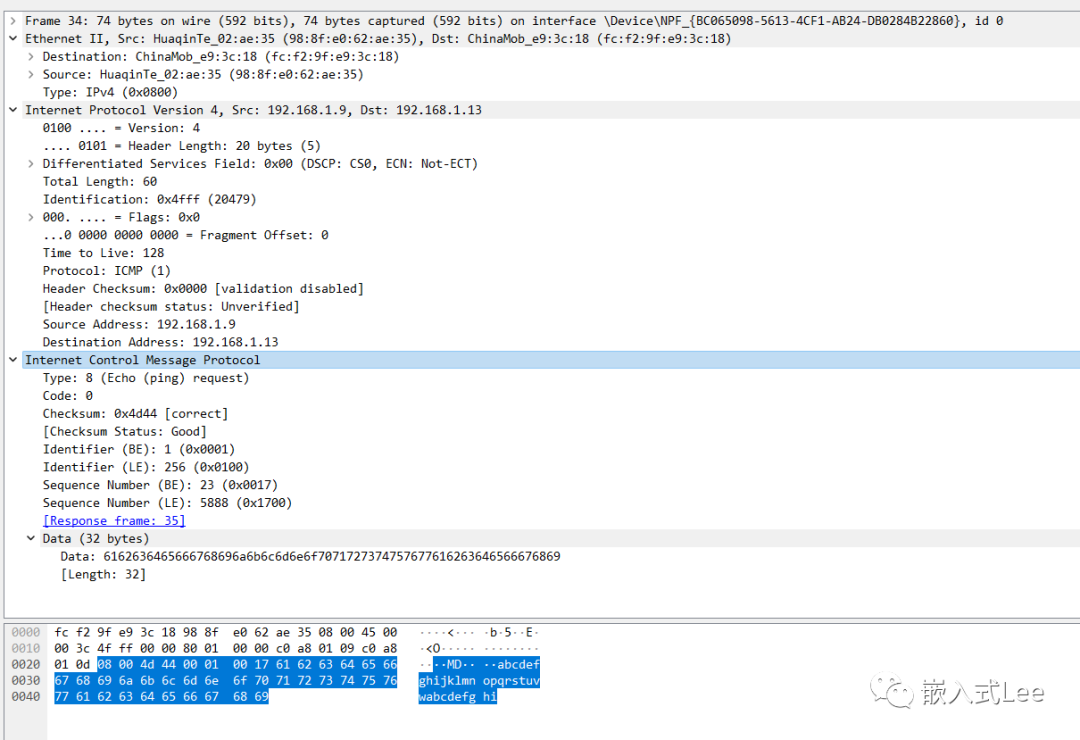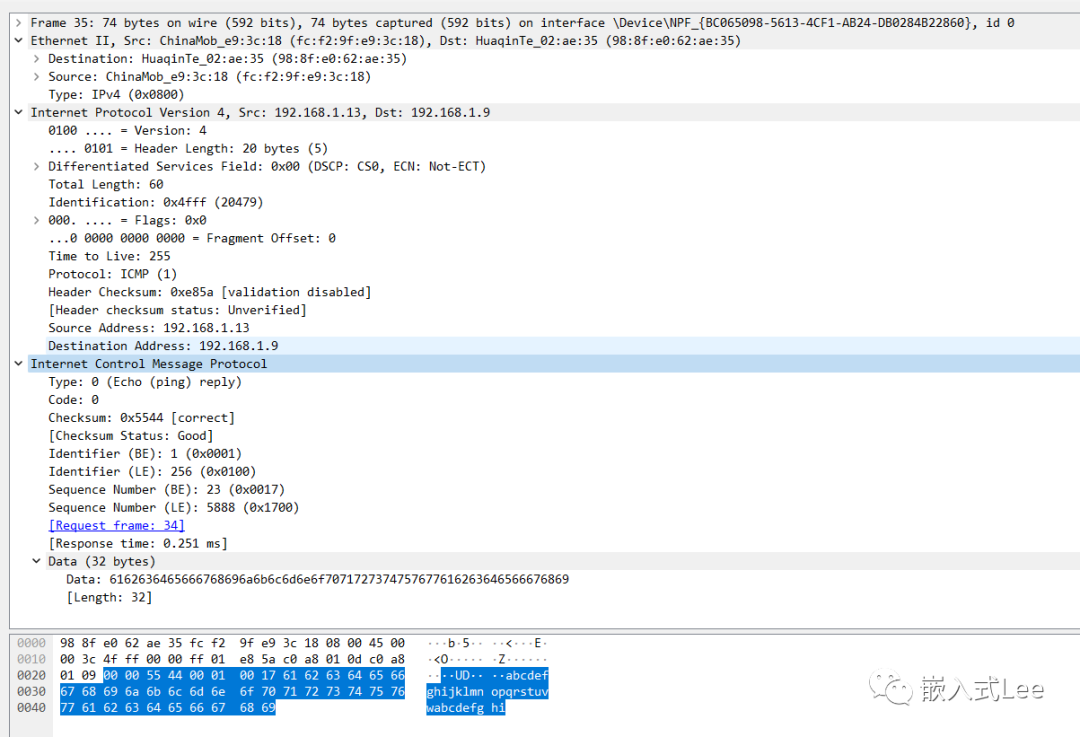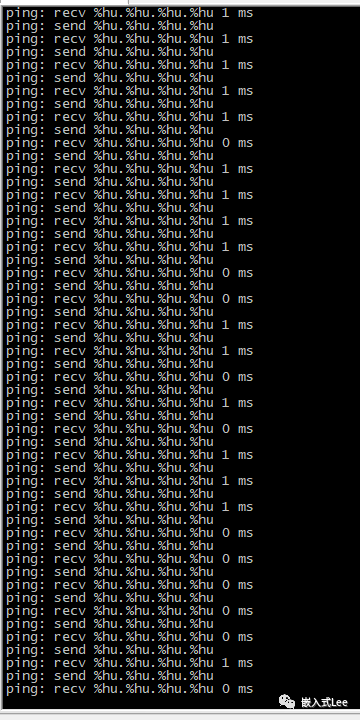ICMP即Internet Control Message Protocol因特网控制消息协议。
ICMP是网络层协议,IP不可分割的一部分。
ICMP用于报告数据报处理中的错误,比如以下情况下时发送ICMP消息:当数据报无法到达其目的地时,当网关没有转发数据报的缓冲能力时,以及当网关可以指示主机在较短的路由上发送数据时。
互联网协议的设计并不是绝对可靠的。ICMP这些控制消息的目的是提供有关通信环境中问题的反馈,而不是使IP可靠。不能确保数据报的传递或控制消息的返回,一些数据报可能无法送达时也没有任何丢失报告。如果需要可靠的通信,则使用IP的更高级别协议必须实现其自己的可靠性程序。
ICMP消息通常报告数据报处理中的错误,且不发送关于ICMP消息的ICMP消息,否则消息会无限递归。此外,ICMP消息只发送关于处理分段数据报的零分段时的错误。(片段零的片段offeset等于零)。
参考
RFC 792
https://www.iana.org/assignments/icmp-parameters/icmp-parameters.xhtml
从 ICMP 的报文格式来说,ICMP 是 IP 的上层协议,他是在IP报的基础上再添加ICMP报格式。但是 ICMP 是分担了 IP 的一部分功能。所以,他也被认为是与 IP 同层的协议。

我们这里只关注ICMP部分,ICMP由首部和数据两部分组成,如下
区域 | 类型 Type | 代码 Code | 校验和 Checksum |
字节大小 | 1 | 1 | 2 |
区域 | 首部数据,根据类型不一样而不一样,对于ping拆为了16位的ID和16位的序列号 | ||
字节大小 | 4 | ||
区域 | ICMP数据部分 | ||
字节大小 | 类型不同长度不同 | ||
Type和Code如下表
类型TYPE | 代码CODE | 用途|描述 Description | 查询类Query | 差错类Error |
0 | 0 | Echo Reply——回显应答(Ping应答) | x | |
3 | 0 | Network Unreachable——网络不可达 | x | |
3 | 1 | Host Unreachable——主机不可达 | x | |
3 | 2 | Protocol Unreachable——协议不可达 | x | |
3 | 3 | Port Unreachable——端口不可达 | x | |
3 | 4 | Fragmentation needed but no frag. bit set——需要进行分片但设置不分片比特 | x | |
3 | 5 | Source routing failed——源站选路失败 | x | |
3 | 6 | Destination network unknown——目的网络未知 | x | |
3 | 7 | Destination host unknown——目的主机未知 | x | |
3 | 8 | Source host isolated (obsolete)——源主机被隔离(作废不用) | x | |
3 | 9 | Destination network administratively prohibited——目的网络被强制禁止 | x | |
3 | 10 | Destination host administratively prohibited——目的主机被强制禁止 | x | |
3 | 11 | Network unreachable for TOS——由于服务类型TOS,网络不可达 | x | |
3 | 12 | Host unreachable for TOS——由于服务类型TOS,主机不可达 | x | |
3 | 13 | Communication administratively prohibited by filtering——由于过滤,通信被强制禁止 | x | |
3 | 14 | Host precedence violation——主机越权 | x | |
3 | 15 | Precedence cutoff in effect——优先中止生效 | x | |
4 | 0 | Source quench——源端被关闭(基本流控制) | ||
5 | 0 | Redirect for network——对网络重定向 | ||
5 | 1 | Redirect for host——对主机重定向 | ||
5 | 2 | Redirect for TOS and network——对服务类型和网络重定向 | ||
5 | 3 | Redirect for TOS and host——对服务类型和主机重定向 | ||
8 | 0 | Echo request——回显请求(Ping请求) | x | |
9 | 0 | Router advertisement——路由器通告 | ||
10 | 0 | Route solicitation——路由器请求 | ||
11 | 0 | TTL equals 0 during transit——传输期间生存时间为0 | x | |
11 | 1 | TTL equals 0 during reassembly——在数据报组装期间生存时间为0 | x | |
12 | 0 | IP header bad (catchall error)——坏的IP首部(包括各种差错) | x | |
12 | 1 | Required options missing——缺少必需的选项 | x | |
13 | 0 | Timestamp request (obsolete)——时间戳请求(作废不用) | x | |
14 | Timestamp reply (obsolete)——时间戳应答(作废不用) | x | ||
15 | 0 | Information request (obsolete)——信息请求(作废不用) | x | |
16 | 0 | Information reply (obsolete)——信息应答(作废不用) | x | |
17 | 0 | Address mask request——地址掩码请求 | x | |
18 | 0 | Address mask reply——地址掩码应答 |


这里只看IPV4相关的,IPV6下也有对应的实现。
ipv4/icmp.c
icmp.h
可以配置宏ICMP_DEBUG,使能调试打印,一遍跟踪对应的程序处理过程。
lwipopts.h中配置
#define ICMP_DEBUG LWIP_DBG_ON
实现了以下Type
定义了头的数据结构
struct icmp_hdr {PACK_STRUCT_FLD_8(u8_t type);PACK_STRUCT_FLD_8(u8_t code);PACK_STRUCT_FIELD(u16_t chksum);PACK_STRUCT_FIELD(u32_t data);} PACK_STRUCT_STRUCT;
如果四echo则,ICMP首部后面4字节数据拆分成id和序列号
struct icmp_echo_hdr {PACK_STRUCT_FLD_8(u8_t type);PACK_STRUCT_FLD_8(u8_t code);PACK_STRUCT_FIELD(u16_t chksum);PACK_STRUCT_FIELD(u16_t id);PACK_STRUCT_FIELD(u16_t seqno);} PACK_STRUCT_STRUCT;
关键代码是icmp_input
ethernet_input->Type=0x0800 ip4_input-> Protocol=0x01 icmp_input
通过switch处理各种类型
switch (type) {case ICMP_ER:
比如对于收到别人的ping请求就是进入
case ICMP_ECHO:
如果是多播地址不响应
然后检查ICMP头部至少要8字节。
然后检查checksum
最后调用ip4_output_if发送响应包。
icmp_dest_unreach
icmp_time_exceeded
都是调用
icmp_send_response
收到响应进入icmp_input的
case ICMP_ER:/* This is OK, echo reply might have been parsed by a raw PCB(as obviously, an echo request has been sent, too). */MIB2_STATS_INC(mib2.icmpinechoreps);break
发送ping可以裸机可以使用raw PCB,带OS可以使用socket实现
详见ping.c/h
/*** PING_DEBUG: Enable debugging for PING.*//** ping receive timeout - in milliseconds *//** ping delay - in milliseconds *//** ping identifier - must fit on a u16_t *//** ping additional data size to include in the packet *//** ping result action - no default action *//* ping variables */static const ip_addr_t* ping_target;static u16_t ping_seq_num;static u32_t ping_time;static struct raw_pcb *ping_pcb;/** Prepare a echo ICMP request */static voidping_prepare_echo( struct icmp_echo_hdr *iecho, u16_t len){size_t i;size_t data_len = len - sizeof(struct icmp_echo_hdr);ICMPH_TYPE_SET(iecho, ICMP_ECHO);ICMPH_CODE_SET(iecho, 0);iecho->chksum = 0;iecho->id = PING_ID;iecho->seqno = lwip_htons(++ping_seq_num);/* fill the additional data buffer with some data */for(i = 0; i < data_len; i++) {((char*)iecho)[sizeof(struct icmp_echo_hdr) + i] = (char)i;}iecho->chksum = inet_chksum(iecho, len);}/* Ping using the socket ip */static err_tping_send(int s, const ip_addr_t *addr){int err;struct icmp_echo_hdr *iecho;struct sockaddr_storage to;size_t ping_size = sizeof(struct icmp_echo_hdr) + PING_DATA_SIZE;LWIP_ASSERT("ping_size is too big", ping_size <= 0xffff);if(IP_IS_V6(addr) && !ip6_addr_isipv4mappedipv6(ip_2_ip6(addr))) {/* todo: support ICMP6 echo */return ERR_VAL;}iecho = (struct icmp_echo_hdr *)mem_malloc((mem_size_t)ping_size);if (!iecho) {return ERR_MEM;}ping_prepare_echo(iecho, (u16_t)ping_size);if(IP_IS_V4(addr)) {struct sockaddr_in *to4 = (struct sockaddr_in*)&to;to4->sin_len = sizeof(*to4);to4->sin_family = AF_INET;inet_addr_from_ip4addr(&to4->sin_addr, ip_2_ip4(addr));}if(IP_IS_V6(addr)) {struct sockaddr_in6 *to6 = (struct sockaddr_in6*)&to;to6->sin6_len = sizeof(*to6);to6->sin6_family = AF_INET6;inet6_addr_from_ip6addr(&to6->sin6_addr, ip_2_ip6(addr));}err = lwip_sendto(s, iecho, ping_size, 0, (struct sockaddr*)&to, sizeof(to));mem_free(iecho);return (err ? ERR_OK : ERR_VAL);}static voidping_recv(int s){char buf[64];int len;struct sockaddr_storage from;int fromlen = sizeof(from);while((len = lwip_recvfrom(s, buf, sizeof(buf), 0, (struct sockaddr*)&from, (socklen_t*)&fromlen)) > 0) {if (len >= (int)(sizeof(struct ip_hdr)+sizeof(struct icmp_echo_hdr))) {ip_addr_t fromaddr;memset(&fromaddr, 0, sizeof(fromaddr));if(from.ss_family == AF_INET) {struct sockaddr_in *from4 = (struct sockaddr_in*)&from;inet_addr_to_ip4addr(ip_2_ip4(&fromaddr), &from4->sin_addr);IP_SET_TYPE_VAL(fromaddr, IPADDR_TYPE_V4);}if(from.ss_family == AF_INET6) {struct sockaddr_in6 *from6 = (struct sockaddr_in6*)&from;inet6_addr_to_ip6addr(ip_2_ip6(&fromaddr), &from6->sin6_addr);IP_SET_TYPE_VAL(fromaddr, IPADDR_TYPE_V6);}LWIP_DEBUGF( PING_DEBUG, ("ping: recv "));ip_addr_debug_print_val(PING_DEBUG, fromaddr);LWIP_DEBUGF( PING_DEBUG, (" %"U32_F" ms\n", (sys_now() - ping_time)));/* todo: support ICMP6 echo */if (IP_IS_V4_VAL(fromaddr)) {struct ip_hdr *iphdr;struct icmp_echo_hdr *iecho;iphdr = (struct ip_hdr *)buf;iecho = (struct icmp_echo_hdr *)(buf + (IPH_HL(iphdr) * 4));if ((iecho->id == PING_ID) && (iecho->seqno == lwip_htons(ping_seq_num))) {/* do some ping result processing */PING_RESULT((ICMPH_TYPE(iecho) == ICMP_ER));return;} else {LWIP_DEBUGF( PING_DEBUG, ("ping: drop\n"));}}}fromlen = sizeof(from);}if (len == 0) {LWIP_DEBUGF( PING_DEBUG, ("ping: recv - %"U32_F" ms - timeout\n", (sys_now()-ping_time)));}/* do some ping result processing */PING_RESULT(0);}static voidping_thread(void *arg){int s;int ret;int timeout = PING_RCV_TIMEO;struct timeval timeout;timeout.tv_sec = PING_RCV_TIMEO/1000;timeout.tv_usec = (PING_RCV_TIMEO%1000)*1000;LWIP_UNUSED_ARG(arg);if(IP_IS_V4(ping_target) || ip6_addr_isipv4mappedipv6(ip_2_ip6(ping_target))) {s = lwip_socket(AF_INET6, SOCK_RAW, IP_PROTO_ICMP);} else {s = lwip_socket(AF_INET6, SOCK_RAW, IP6_NEXTH_ICMP6);}s = lwip_socket(AF_INET, SOCK_RAW, IP_PROTO_ICMP);if (s < 0) {return;}ret = lwip_setsockopt(s, SOL_SOCKET, SO_RCVTIMEO, &timeout, sizeof(timeout));LWIP_ASSERT("setting receive timeout failed", ret == 0);LWIP_UNUSED_ARG(ret);while (1) {if (ping_send(s, ping_target) == ERR_OK) {LWIP_DEBUGF( PING_DEBUG, ("ping: send "));ip_addr_debug_print(PING_DEBUG, ping_target);LWIP_DEBUGF( PING_DEBUG, ("\n"));ping_time = sys_now();ping_recv(s);} else {LWIP_DEBUGF( PING_DEBUG, ("ping: send "));ip_addr_debug_print(PING_DEBUG, ping_target);LWIP_DEBUGF( PING_DEBUG, (" - error\n"));}sys_msleep(PING_DELAY);}}/* Ping using the raw ip */static u8_tping_recv(void *arg, struct raw_pcb *pcb, struct pbuf *p, const ip_addr_t *addr){struct icmp_echo_hdr *iecho;LWIP_UNUSED_ARG(arg);LWIP_UNUSED_ARG(pcb);LWIP_UNUSED_ARG(addr);LWIP_ASSERT("p != NULL", p != NULL);if ((p->tot_len >= (PBUF_IP_HLEN + sizeof(struct icmp_echo_hdr))) &&pbuf_remove_header(p, PBUF_IP_HLEN) == 0) {iecho = (struct icmp_echo_hdr *)p->payload;if ((iecho->id == PING_ID) && (iecho->seqno == lwip_htons(ping_seq_num))) {LWIP_DEBUGF( PING_DEBUG, ("ping: recv "));ip_addr_debug_print(PING_DEBUG, addr);LWIP_DEBUGF( PING_DEBUG, (" %"U32_F" ms\n", (sys_now()-ping_time)));/* do some ping result processing */PING_RESULT(1);pbuf_free(p);return 1; /* eat the packet */}/* not eaten, restore original packet */pbuf_add_header(p, PBUF_IP_HLEN);}return 0; /* don't eat the packet */}static voidping_send(struct raw_pcb *raw, const ip_addr_t *addr){struct pbuf *p;struct icmp_echo_hdr *iecho;size_t ping_size = sizeof(struct icmp_echo_hdr) + PING_DATA_SIZE;LWIP_DEBUGF( PING_DEBUG, ("ping: send "));ip_addr_debug_print(PING_DEBUG, addr);LWIP_DEBUGF( PING_DEBUG, ("\n"));LWIP_ASSERT("ping_size <= 0xffff", ping_size <= 0xffff);p = pbuf_alloc(PBUF_IP, (u16_t)ping_size, PBUF_RAM);if (!p) {return;}if ((p->len == p->tot_len) && (p->next == NULL)) {iecho = (struct icmp_echo_hdr *)p->payload;ping_prepare_echo(iecho, (u16_t)ping_size);raw_sendto(raw, p, addr);ping_time = sys_now();}pbuf_free(p);}static voidping_timeout(void *arg){struct raw_pcb *pcb = (struct raw_pcb*)arg;LWIP_ASSERT("ping_timeout: no pcb given!", pcb != NULL);ping_send(pcb, ping_target);sys_timeout(PING_DELAY, ping_timeout, pcb);}static voidping_raw_init(void){ping_pcb = raw_new(IP_PROTO_ICMP);LWIP_ASSERT("ping_pcb != NULL", ping_pcb != NULL);raw_recv(ping_pcb, ping_recv, NULL);raw_bind(ping_pcb, IP_ADDR_ANY);sys_timeout(PING_DELAY, ping_timeout, ping_pcb);}voidping_send_now(void){LWIP_ASSERT("ping_pcb != NULL", ping_pcb != NULL);ping_send(ping_pcb, ping_target);}voidping_init(const ip_addr_t* ping_addr){ping_target = ping_addr;sys_thread_new("ping_thread", ping_thread, NULL, DEFAULT_THREAD_STACKSIZE, DEFAULT_THREAD_PRIO);ping_raw_init();}
/*** PING_USE_SOCKETS: Set to 1 to use sockets, otherwise the raw api is used*/void ping_init(const ip_addr_t* ping_addr);void ping_send_now(void);
如下是带OS的测试
ip_addr_t ping_addr;IP4_ADDR(&ping_addr, 192, 168, 1, 9);ping_init(&ping_addr);
打印如下,(这里printf不支持某些格式所以IP地址打印显示不对)

了解ICMP包的格式,了解LWIP发送ping和对堆ping请求响应的过程。